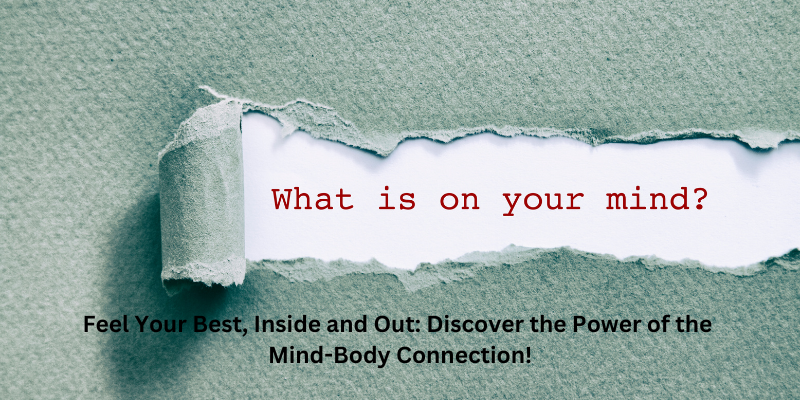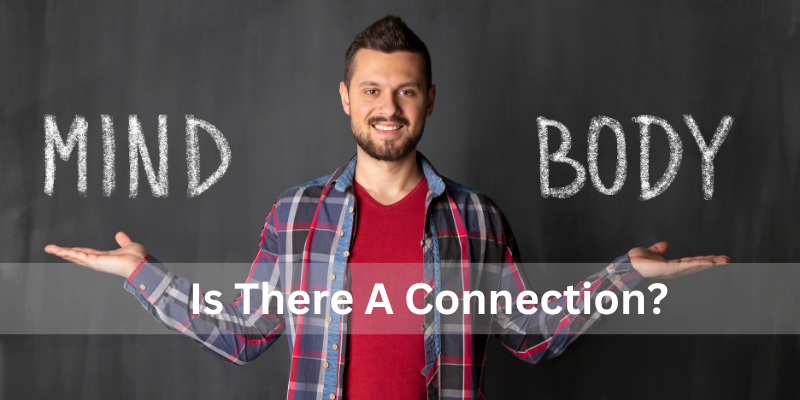If you’re curious about alternative or complementary medicine, it follows that “What is the mind-body connection?” would be the next question. Well, the mind-body connection is all about how your thoughts, feelings, and attitudes can and do directly affect your physical health.
Is the Mind-Body Connection a New Concept?
Not at all. In fact, the historical roots are deep. Traditional Chinese medicine and Ayurveda have always depended on the interplay between the mind and body for health, healing, and well-being. Plato and Hippocrates often discussed the relationship between mental health and physical health.
In the 17th century, René Descartes was probably responsible for separating the mind and body, and that has influenced modern medicine until today.
However, today, modern science seems to be taking a fresh look at the connection between our thoughts, emotions, and attitudes and our physical health.
In fact, as people seek more effective ways to heal and achieve overall wellness, holistic approaches to health and well-being are rapidly gaining popularity today. People everywhere are asking for more information about alternative health care.
What is the Mind-Body Connection?

The idea of the mind-body connection refers to a profound and intimate relationship between your state of mind and your physical health.
It means that your thoughts, emotions, and attitudes will directly influence your physical health. It also means that your physical health will directly influence your thoughts, emotions, and attitudes.
Your nervous system, hormones, and biochemical pathways reconcile the connection between your brain and the rest of your body.
The brain-body connection is simple to understand when you think about how stress and anxiety can cause physical symptoms like headaches and a faster heartbeat.
On the other hand, consider how physical exercise improves your mood and helps you think better.
The more you consider, nurture, and understand this connection, the better your health will be.
The Science Behind the Mind-Body Connection
The science is simple enough and difficult to deny. Your brain and body are constantly communicating via your nervous system.
Stress manifests as specific physical symptoms, such as tension in your neck and back muscles. Stress can be responsible for shortness of breath and high blood pressure.
In contrast, when you’re happy and everything goes your way, your body feels better. Your emotions and thoughts trigger chemical reactions that impact everything from your immune system to your blood pressure, causing all of this.
The Benefits of the Mind-Body Connection
Nurturing the mind-body connection can lead to significant improvements in both mental and physical health and is the cornerstone of complementary and alternative therapies. Let’s see how embracing practices that strengthen this connection enhances overall well-being and fosters a more balanced life.
Physical Health Benefits
Staying tuned into the mind-body connection offers amazing physical health benefits.
For instance, it can strengthen your immune system, enhancing its ability to combat illnesses more successfully.
Utilizing techniques like mindfulness and meditation can make a real difference in how you perceive pain and how much it affects your daily life. People who employ mind-body techniques frequently recuperate from surgeries or injuries more quickly.
Mental Health Benefits
Your mental health gets a big boost too. Routines that enhance the mind-body connection can significantly reduce stress levels. This means fewer anxiety attacks, a more stable mood, and clarity when it comes to day-to-day work activities. You’ll find yourself feeling happier and more at peace as your mind sharpens and your memory and cognitive functions improve.
Overall Well-being
The mind body connection is all about holistic health. When your mind and body are in sync, you will have more energy, feel more alive, and be more in tune with your surroundings.
Your quality of life will improve, making it more enjoyable. You will not only steer clear of illness, but also flourish in every facet of your life.
Practices that Strengthen the Mind-Body Connection
Taking positive steps to strengthen the mind-body connection is crucial for maintaining holistic health. By actively working on this connection, you can achieve a more harmonious and resilient state of being.
Meditation and Mindfulness
Practicing simple meditation and mindfulness techniques is a great way to strengthen the mind-body connection. There are a multitude of ways and places to practice meditation and mindfulness. If you’re not familiar, a quick search online will get you on your way.
Just start with a few minutes a day by sitting quietly with closed eyes and paying attention to your breathing for a few minutes a day. As little as 5 minutes a day will keep you in touch with the present moment, which will reduce stress and anxiety.
Breathing Techniques
The mind-body connection is probably rooted with proper breathing. Practicing deep belly breathing can really calm your mind and increase your energy.
It’s easy to get started with deep belly breathing too. Just sit comfortably, place one hand on your chest and the other on your belly. Inhale deeply through your nose, letting your belly expand. Exhale slowly through your mouth. Repeat for a few minutes each day.
Yoga and Tai Chi
Yoga and Tai Chi combine physical movement with mental focus. Both of these improve flexibility, balance, and strength while calming your mind. You don’t need to be super flexible or fit to start, either. There are plenty of beginner routines available online. Just find a quiet space, roll out a mat, and follow along.
Biofeedback and Neurofeedback
Biofeedback and neurofeedback are fascinating techniques. They use electronic devices to monitor physiological functions such as heart rate or brain waves. This feedback helps you learn how to control these functions consciously. It’s like getting a sneak peek into how your body responds to stress and learning to manage it better.
Diet and Nutrition
Eating for a Healthy Mind and Body
What you eat plays a huge role in your mind-body connection. A balanced diet rich in fruits, vegetables, whole grains, and lean proteins will support both physical and mental health. Foods, like fatty fish, nuts, and leafy greens, are good for brain function. Don’t forget to stay hydrated!
Mindful Eating
Mindful eating is about paying full attention to your actual eating experience. It’s not just about what you eat, but how you eat. Take your time, savor each bite, and listen for your body’s hunger and fullness cues. Being aware of when you’re full and stopping can help improve digestion, help you enjoy your food more, and aid in weight management.
Integrative Therapies
Acupuncture and Acupressure
Acupuncture and acupressure involve stimulating specific points on the body to promote healing and balance. Acupuncture uses thin needles and acupressure uses pressure from fingers or tools. Either of these therapies can relieve pain, reduce stress, and improve overall well-being. The sessions last about an hour or less and leave you relaxed and calm.
Chiropractic Care
Chiropractors focus primarily on your spine. They use hands on adjustments in their office that improve spine alignment, which can stop pain and improve many physical functions. Regular chiropractic care has a positive impact on your mind-body connection and helps with chronic pain and physical discomfort.
Massage Therapy
It seems that most people consider massages and massage therapy a luxury, but massage is a powerful tool for mind body health. There are different types of massages, like Swedish, deep tissue, and more, but they are all beneficial. They can reduce muscle tension, improve circulation, and relax you.
Emotional and Mental Techniques
Cognitive Behavioral Therapy (CBT)
CBT is a type of psychotherapy that helps you change negative thought patterns. It’s effective for anxiety, depression, and other mental health issues. Learning to think differently can help you improve your physical health. Look for a licensed therapist who specializes in CBT.
Art and Music Therapy
Art and music therapy uses creative expression to improve mental and emotional health. These therapies can reduce stress, enhance your mood, and emotions. Whether you’re painting, drawing, or playing an instrument, art and music can be incredibly therapeutic.
Lifestyle Changes for a Stronger Mind-Body Connection
Exercise and Physical Activity
Regular exercise is crucial for the mind-body connection. Physical activity boosts your endorphins which are the body’s natural mood lifters, and improves your overall health. You don’t need to hit the gym every day. A daily walk or a few minutes of stretching every day can make a big difference.
Sleep and Relaxation
Quality sleep is essential for your mind and your body. Every human needs 7-9 hours of sleep per night. If you have problems with sleep, try creating a relaxing bedtime routine to help you wind down. Avoid screens before bed, and try relaxation techniques like reading or taking a warm bath. Good sleep improves moods, energy levels, and overall health.
Conclusion
In conclusion, the mind-body connection is a profound and essential relationship between your thoughts, emotions, and physical health. Modern science is little by little embracing the connection when it comes to holistic approaches to overall health and well being.
You too can experience significant improvements in your personal life both mental and physical. Simple practices like mindfulness, meditation, deep breathing, yoga, and a balanced diet can help strengthen the mind body bond.
Remember, when your mind and body are in sync, you feel more energetic, balanced, and connected to your surroundings. Embracing the mind-body connection is a journey towards better health and a more fulfilling life. Start small, be consistent, and watch how these practices positively impact your overall well-being.
